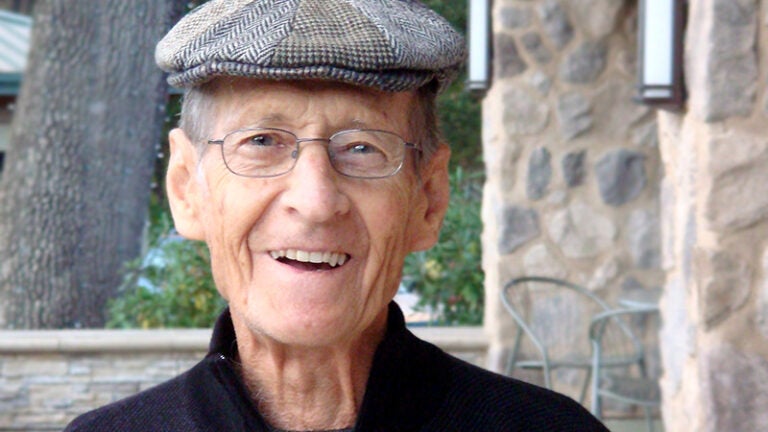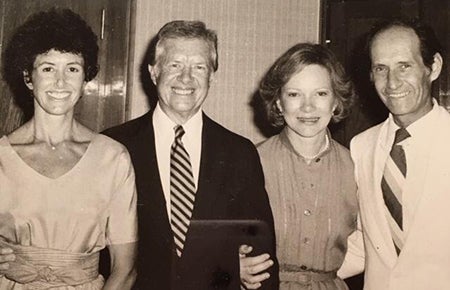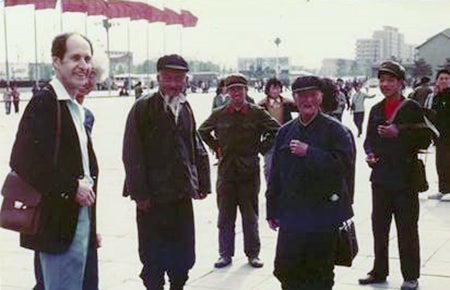
In Memoriam: Otto Schnepp
A few individuals seem to pack two or three lifetimes worth of experience into one. Otto Schnepp was one of those people.
The longtime USC Dornsife professor of chemistry and innovator in the field of molecular spectroscopy was also the nation’s first science and technology attaché to the U.S. Embassy in Beijing, China, director of the USC East Asian Studies Center and a five-language polylinguist.
The self-described citizen of the world died Jan. 2 in Walnut Creek, Calif. He was 93.
Flight from Nazi Europe to China
Schnepp was born in Vienna in 1925. Fleeing Nazi persecution, his family headed to Shanghai in 1939, joining thousands of other Jewish refugees and longtime residents. A 1997 Los Angeles Times article that described how Jews escaped the Holocaust by moving to China for the duration of World War II featured Schnepp.
Along with other refugees, Schnepp’s family scratched out a living, moving between the city’s International Settlement and French Quarter as circumstances dictated. They experienced hardship, but perhaps not as much as some; Otto’s father, a doctor, continued practicing medicine.
“It was kind of a hand-to-mouth life,” Schnepp said in the article. “Sometimes you could earn something, sometimes it was harder.” It became a test of endurance. “Basically, we lived for the end of the war. That was my attitude.”
Once the war ended, Schnepp remained in Shanghai, earning a degree in chemistry in 1947. Remarkably, he was “virtually the only non-Chinese student” attending St. John’s University, an American Episcopalian University, said Debbie Zelnik, Schnepp’s daughter. Her father’s wartime experiences in Shanghai, fluency in Chinese and growing familiarity with the country’s culture would play large roles in his future.

From right, Otto Schnepp in 1981 with first lady Rosalynn Carter, President Jimmy Carter and Judith Stransky, Schnepp’s spouse at the time.
Schnepp earned a Ph.D. in chemistry at the University of California, Berkeley in 1951. USC Dornsife Emeritus Professor of Chemistry David Dows was a Berkeley undergraduate at the time.
“[Schnepp] became a mentor to me and helped me find out what research was all about,” Dows said.
With degree in hand, Otto headed to the National Bureau of Standards in Washington, D.C., and then emigrated to Israel.
In the aftermath of his wartime experience, Schnepp felt a strong conviction to take part in Israel’s historic, post-war emergence as a nation. “I was very greatly influenced by the Holocaust and what it almost did to me as well as family and many people I knew,” he explained in a 2000 interview for the USC Living History Project by the USC Emeriti Center. He joined the faculty of the Israel Institute of Technology in 1952 and lived in Haifa for 13 years.
Opportunity beckons at USC
Over the years, Schnepp would reconnect several times with Dows, then a professor in USC’s Department of Chemistry, at scientific conferences. At one meeting, Dows described the USC department’s efforts to grow. “It turned out [Schnepp] was thinking of returning to the U.S.,” said Dows, then department chair.
USC hired Schnepp as a professor of chemistry in 1965.
As a researcher, he is remembered for contributions in the field of optical molecular spectroscopy, the study of light’s interaction with matter.
Schnepp’s research focused on the structure and excited states of molecular solids. His research group invented an instrument that could make measurements in a previously inaccessible “vacuum ultraviolet” spectral region.
Schnepp enjoyed a satisfying mix of research and teaching at the university and earned USC awards that included Outstanding Professor and the Associates Award for Creative Scholarship and Research in 1979.
“It is often said that research is a series of ups and downs, manic times and depressive times,” he said in his USC Living History interview. “It is nice to be at an academic institution because when the lows — the disappointments — come, there is always something solid in the background.” He considered that solid foundation to be teaching.
During a sabbatical in Israel in 1968, Schnepp collaborated with a Ph.D. student named Arieh Warshel. They were trying to calculate the vibrations of molecular crystal and analyze corresponding forces. Warshel was already hard at work on the quantum computing approach that would ultimately make him famous.
“Although Otto did not believe that my Cartesian computer program could easily perform such a traditionally challenging task, he had the inherent wisdom to let me go forward,” Warshel recalls. A few years later Schnepp helped recruit Warshel to join USC, where Warshel, now Distinguished Professor of Chemistry at USC Dornsife, would later win the Nobel Prize in chemistry.

Otto Schnepp, left, served as a counselor for science and technology at the U.S. embassy in Beijing from 1980 to 1982.
Warshel said he fondly remembers the kindness Schnepp showed him and his family upon their arrival to Los Angeles. The USC colleagues became close friends and later got in the habit of meeting for conversation in Hebrew over lunch or coffee.
“We talked about politics, the human condition and science,” as well as the origin of certain Hebrew words. “I will clearly miss Otto Schnepp,” Warshel said.
Our man in Beijing
Taking a leave from USC, Schnepp returned to China in 1980 to serve as science attaché to the U.S. Embassy. He provided guidance in promoting technology transfer between the two nations in science, technology, agriculture and medicine.
Having graduated from a Chinese university, he was fluent in the language and understood the people and their culture.
“Whenever Otto mentioned his graduation from St John’s University to the Chinese, it opened doors to him among the Chinese cadres, universities and institutions,” Zelnik said. “They welcomed him with open arms and opened up to him almost as if he were one of them.”
She added that her father was extremely proud when he was promoted to science counselor a year later, the highest rank below ambassador. He also received a Superior Honor Award for his service from the U.S. Department of State in 1982.
Director of East Asian studies
Schnepp subsequently returned to USC as a professor and served as chair of the chemistry department before transitioning to emeritus status. He maintained an active presence at USC. Starting in 1994, he served six years as director of USC Dornsife’s East Asian Studies Center. The center credits him for playing a vital role in the development of the center by encouraging and supporting many academic activities related to Asia during his directorship.
Once asked what motivated him to make one of his many global moves, Schnepp said this: “I was looking forward to a different experience, a different adventure, if you like. Life is in my view a series of adventures.” By that measure, Otto Schnepp had his share, and then some.
Schnepp was predeceased by his wife, Eileen. He is survived by daughters Debbie Zelnik and Tamar Schnepp and by five grandchildren.